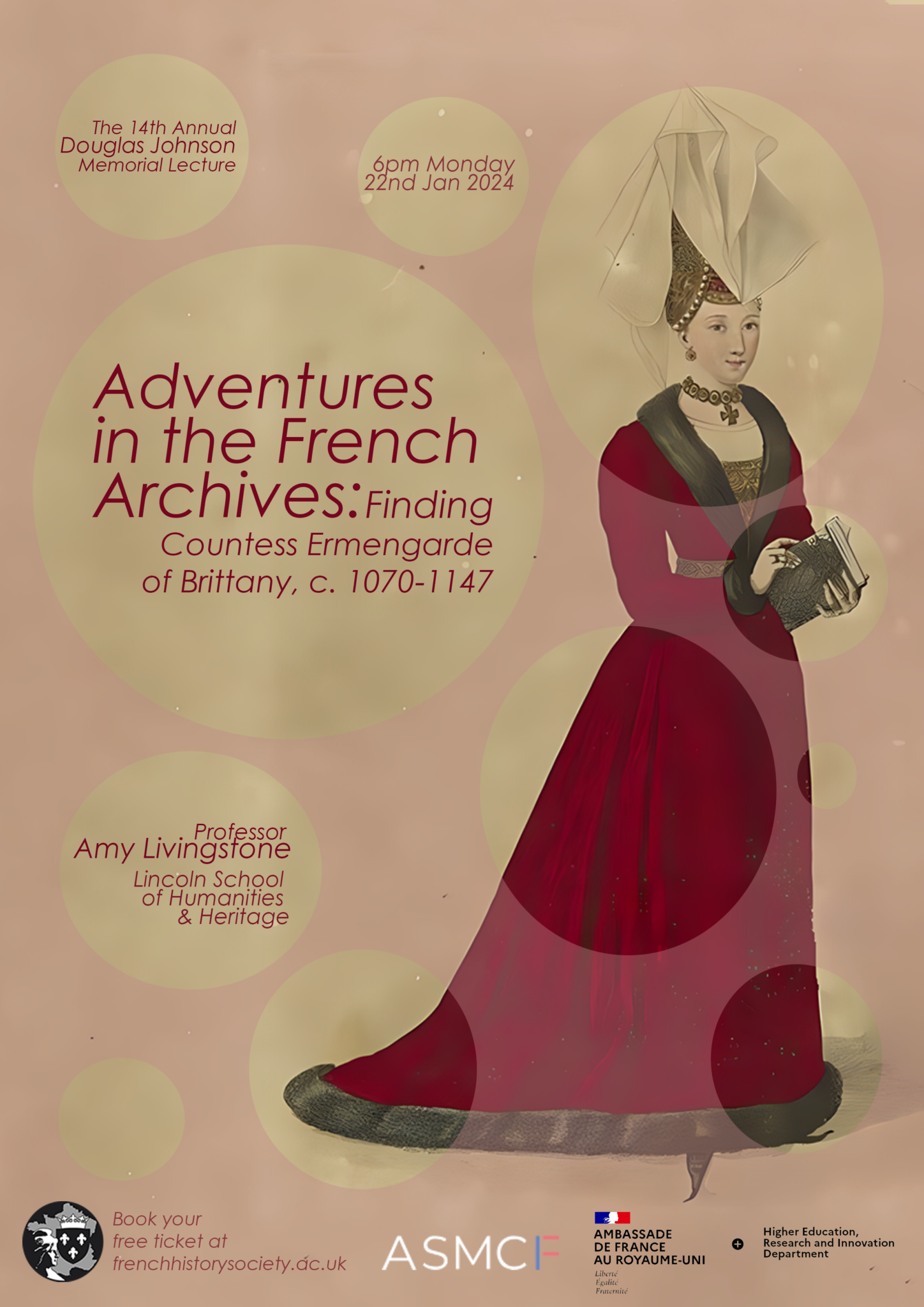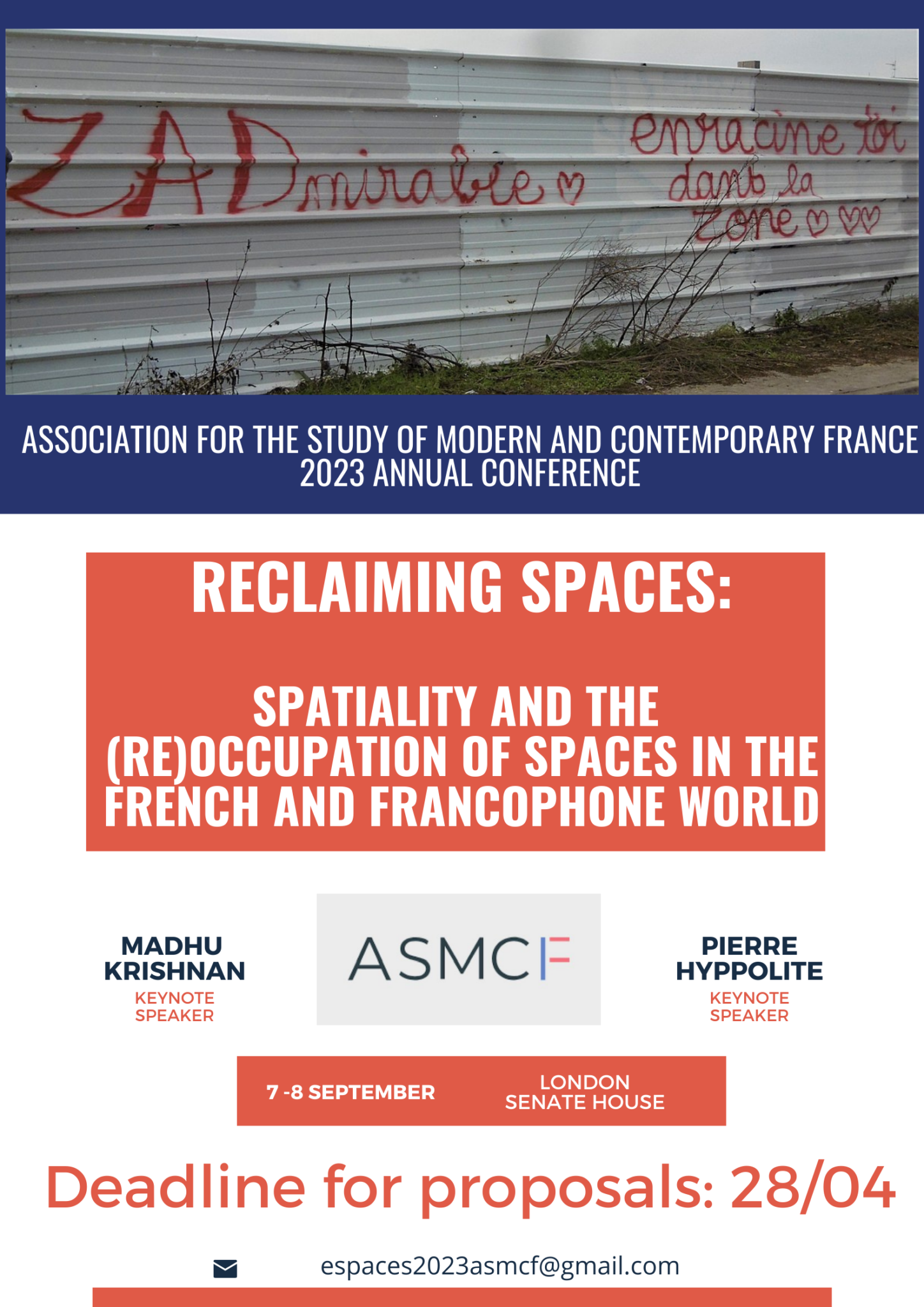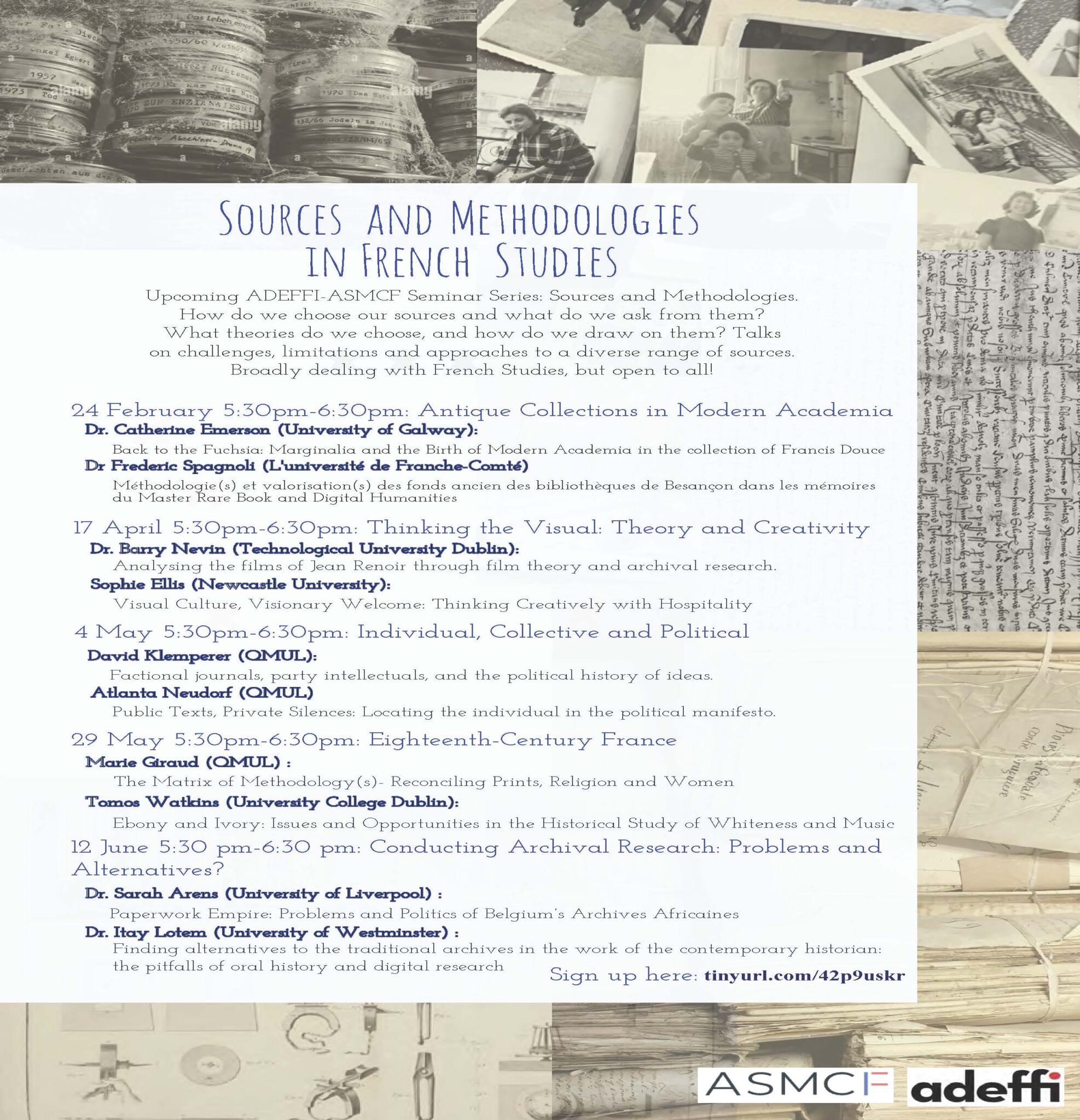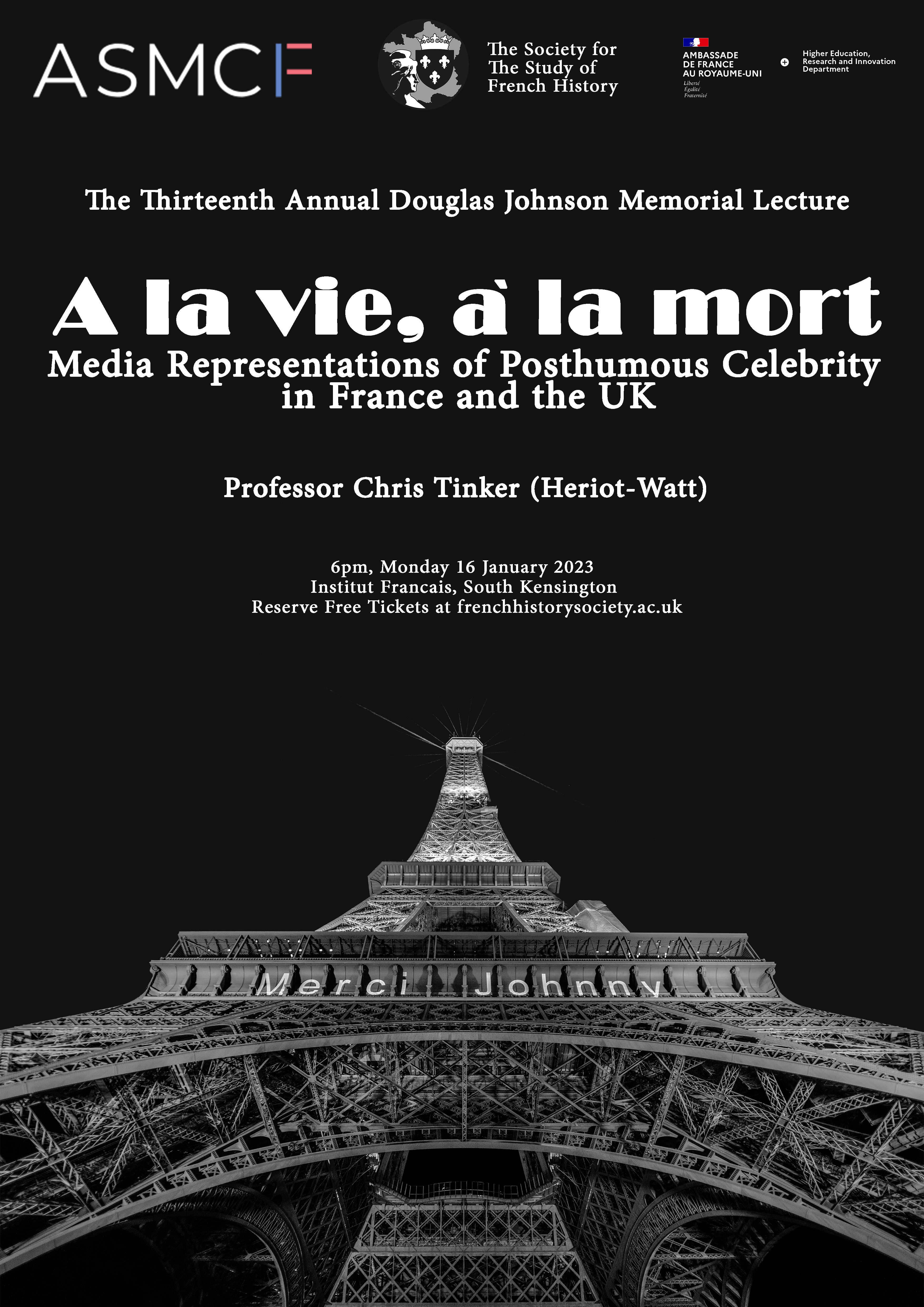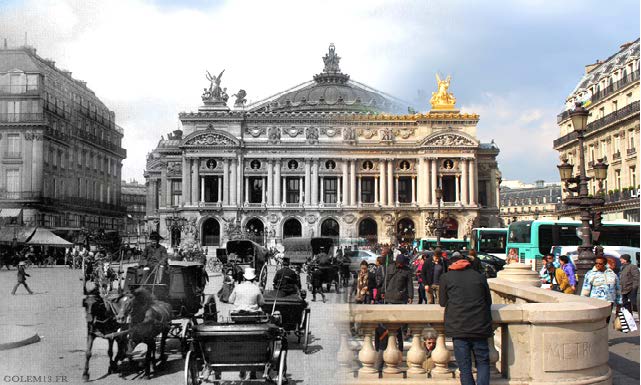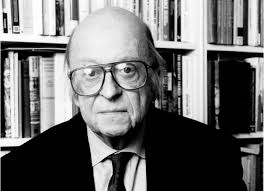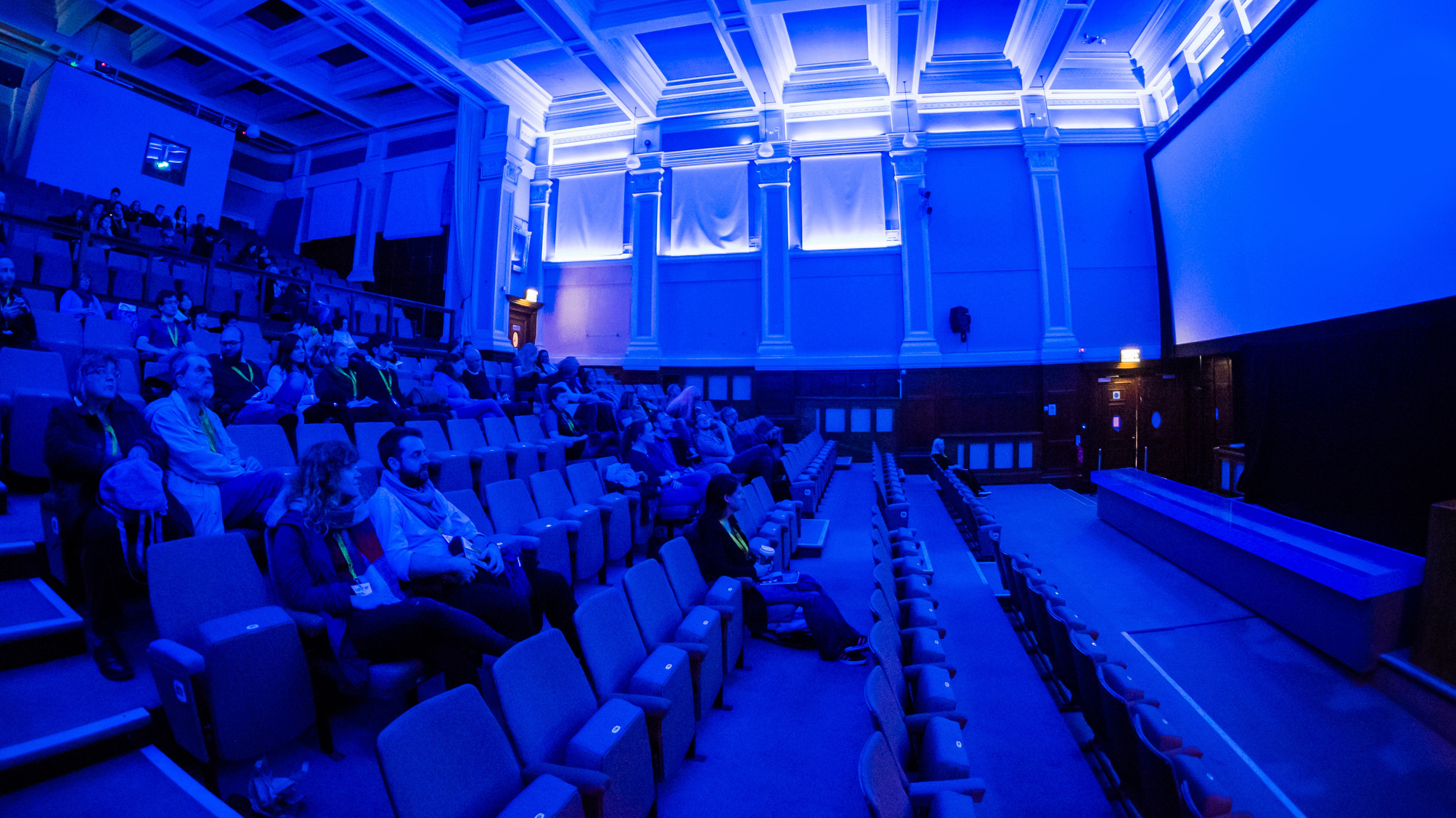Archive Conferences and Events
Douglas Johnson Memorial Lecture 2024
Fourteenth Douglas Johnson Memorial Lecture in French History. The Society for the Study of French History and The Association for the Study of Modern and Contemporary France Present: The Annual Douglas Johnson Memorial Lecture, Monday 22nd January 2024. Adventures in the French Archives: Finding Countess Ermengarde of Brittany, c. 1070-1147 Professor Amy Livingstone (Lincoln School of Humanities and Heritage) The 2024 Annual Douglas Johnson Memorial Lecture was the 14th in this series, organised by the Society for the Study of French History and the Association for the Study of Modern and Contemporary France. It was held at the the Institut français, South Kensington, London. We were delighted to welcome Professor Amy Livingstone (Lincoln School of Humanities and Heritage) to give a paper entitled ‘Adventures in the French Archives: Finding Countess Ermengarde of Brittany, c. 1070-1147’. Click here to watch the recording: Watch the 2024 Douglas Johnson Memorial Lecture Abstract: Although described as the ‘jewel of Brittany’ by Bishop Marbode of Rennes, and respected by her peers, Countess Ermengarde of Brittany does not feature in the history of medieval France. This lecture will restore Ermengarde to view and situate her in the history eleventh and twelfth-century France. It will explore her accomplishments, such as co-ruling Brittany with her husband and adult son, her generous patronage and support of the church, her travel to the Holy Land – where she built a church, and her friendships with some of the most influential individuals of her day. But why has Ermengarde been left out of accounts of the past? As well as discussing Ermengarde and her experiences, this lecture will address the scholarly process of finding Ermengarde and restoring her to accounts of the medieval past. Bio: Amy Livingstone is the Head of the Lincoln School of Humanities and Heritage and Professor of Medieval History. Previously she was the Associate Dean of the Honors College and Professor of History at Ball State University in Indiana and the H.O. Hirt Professor of History at Wittenberg University in Ohio. She is a scholar of medieval Europe and her research focuses on the aristocracy of medieval France, particularly women and the family. She is the author of Out of Love for My Kin: Aristocratic Family Life in the Lands of the Loire, 1000-1200, Medieval Lives, c. 1000-1292: The World of the Beaugency Family, as well as many articles and essays. In 2017 she received the Medieval Academy of America/Committee on Centers and Regional Associations Teaching Excellence Award. Professor Livingstone is also the co-editor of Medieval People, a Fellow of the Royal Historical Society, a former councillor of the Medieval Academy of America, and a life member of Clare Hall, Cambridge. Currently, she is working on a biography of of Countess Ermengarde of Brittany, the topic of her lecture.
ASMCF Annual Conference 2023
Reclaiming Spaces: Spatiality and the (Re)occupation of Spaces in the French and Francophone World 7-8 September 2023 Institute of Languages, Cultures and Societies, University of London, Senate House, Malet Street, London WC1E 7HU Confirmed keynote speakers: Professor Madhu Krishnan (Bristol) & Professor Pierre Hyppolite (Paris Nanterre) The 2023 ASMCF annual conference will seek to explore the concept of spatiality: the physical and social dimensions of space and how they shape our experiences, identities, and cultures. The theme builds on last year’s conference on “presence, absence, hybridity” and interrogates the occupation of spaces as a means to understand modern and contemporary French and Francophone cultures and identities. This is of particular importance at a time when people are (re)occupying spaces that had been restricted during the COVID-19 pandemic and reflecting on the new relation to space brought about by this crisis. To mark this reoccupation of spaces and the first in-person conference since the pandemic, the 2023 conference will take place in London - a hub of Anglo-French relations. For centuries, London has been a haven of revolutionary émigrés and governments in exile and the site of a thriving francophone community. Drawing on the lessons learned during the COVID-19 pandemic, especially with regard to accessibility and environmental impact, hybrid modes of participation will also be possible. For the call for papers, programme and all additional information, please visit our dedicated webpage here. You can register for the conference by clicking here: Conference Registration. The deadline for registration is Sunday, 20th August.
ASMCF-SSFH Postgraduate Study Day 2023
The 2023 Postgraduate Study Day Conflict and Opposition will be held online on 11 March 2023. Full details and the call for papers, both in English and in French may be found on the dedicated Study Day page. Register for the Study Day here: Study Day Registration
Sources and Methodologies Seminar Series
An ADEFFI-ASMCF Seminar Series: Sources and Methodologies in French Studies How do we choose our sources and what do we ask from them? What theories do we choose, and how do we draw on them? Talks on challenges, limitations and approaches to a diverse range of sources. Broadly dealing with French Studies, but open to all! Sign up here: Seminar Registration You can find the full programme below, or download it here: Seminar Series Programme All events will run 5.30-6.30pm (BST) 24 February : Antique Collections in Modern Academia Dr. Catherine Emerson (University of Galway): Back to the Fuchsia: Marginalia and the Birth of Modern Academia in the collection of Francis Douce Dr Frederic Spagnoli (L'université de Franche-Comté): Méthodologie(s) et valorisation(s) des fonds ancien des bibliothèques de Besançon dans les mémoires du Master Rare Book and Digital Humanities 17 April : Thinking the Visual: Theory and Creativity Dr. Barry Nevin (Technological University Dublin): Analysing the films of Jean Renoir through film theory and archival research. Sophie Ellis (Newcastle University): Visual Culture, Visionary Welcome: Thinking Creatively with Hospitality 4 May : Individual, Collective and Political David Klemperer (QMUL): Factional journals, party intellectuals, and the political history of ideas. Atlanta Neudorf (QMUL): Public Texts, Private Silences: Locating the individual in the political manifesto. 29 May : Eighteenth-Century France Marie Giraud (QMUL) : The Matrix of Methodology(s)- Reconciling Prints, Religion and Women Tomos Watkins (University College Dublin): Ebony and Ivory: Issues and Opportunities in the Historical Study of Whiteness and Music 12 June : Conducting Archival Research: Problems and Alternatives? Dr. Sarah Arens (University of Liverpool) : Paperwork Empire: Problems and Politics of Belgium’s Archives Africaines Dr. Itay Lotem (University of Westminster) : Finding alternatives to the traditional archives in the work of the contemporary historian: the pitfalls of oral history and digital research
Douglas Johnson Memorial Lecture 2023
The 2023 Annual Douglas Johnson Memorial Lecture was the 13th in this series, organised by the Society for the Study of French History and the Association for the Study of Modern and Contemporary France. It was held at the the Institut français, South Kensington, London on Monday 16th January, 1800-2030 (GMT). We were delighted to welcome Professor Chris Tinker (Heriot-Watt University) to give a paper entitled 'À la vie, à la mort: Media Representations of Posthumous Celebrity in France and the UK'. Click here to watch the lecture: 2023 Douglas Johnson Memorial Lecture Image courtesy of Gordon Shukwit and used with photographer's permission - CC BY-NC-ND 2.0
ASMCF Annual Conference 2022
Call for Papers ASMCF Annual Conference 2022 Presence, absence, hybridity: future directions in French and Francophone Studies 8-9 September 2022 (Online) The 2022 ASMCF annual conference will seek to explore the concepts of presence, absence, and hybridity as well as future directions in French and Francophone Studies as a way of understanding the development of modern and contemporary French and Francophone cultures and identities as the world tries to face up to the challenge of the Covid-19 pandemic and its aftermath. Drawing on the technological challenges and innovations of the last two years, the 2022 ASMCF annual conference shall be held online and hosted by the Association. For the full Call for Papers, please visit the conference page or download the pdf.
ASMCF-SSFH Postgraduate Study Day 2022
ASMCF-SSFH Postgraduate Study Day 2022 Call for papers - Images: Past & Present A virtual study day to be held on 23 April 2022 Keynote: To Be Confirmed What happens when the images come into the world? With or without its consent, civil society has been constantly imaged, recorded, documented, archived and exhibited. This omnipresence of images created, circulated, and displayed merits an analysis of the multiplicity of its forms and its roots. This year, we have decided to focus on images, their disconcerting plurality, and their power which keeps in reserve infinite possibilities of actualisation; we have decided to follow them through heterogeneous geographies and temporalities of the French and Francophone world. Click to access the CFP as a pdf, or visit the Study Day page for more details.
Douglas Johnson Memorial Lecture 2022
The Society for the Study of French History and The Association for the Study of Modern and Contemporary France were pleased to present: The Douglas Johnson Memorial Lecture, Monday 17th January 2022. The Saint Bartholomew’s Day Massacres 450 years on Professor Penny Roberts (University of Warwick) Click here to watch the Lecture: Douglas Johnson Memorial Lecture 2022
ASMCF Annual Conference 2021
Association for the Study of Modern and Contemporary France, University of Chester, September 2nd-September 4th 2021. Islands and archipelagos Îles et archipels The annual ASMCF conference will seek to explore the concept of Islands and archipelagos as a way of understanding the development of modern and contemporary French and Francophone cultures and identities, particularly at a time of global resurgence in populism and isolationism. In France, haunted by what is perceived as ”communautarisme“, even “séparatisme” and the loss of cohesion in a historically united country, the “archipel français” (Jérôme Fourquet) is an increasingly widespread (and indeed highly controversial) metaphor in public discourse. The topic thus allows us to debate the future of multiculturalism and diversity in France, and to debate the rise of terrorism and its links with Republican identities. The recent crisis has also raised the question of civic engagement, a new desire for solidarity and brought to the forefront the question of isolation in new ways. The island trope enables us to interrogate different aspects of modern and contemporary France: political, historical, and cultural. What did the TGV network do to French cities, now forming an archipelago of extremely well-connected urban spaces, whilst anger is growing in rural spaces and small towns outside of that network? How are these concerns reflected in cultural, literary and visual texts? But has France ever been that historically united country it likes to appear? How do we talk about historical diversity (the “composition française” as Mona Ozouf put it), about regional languages and identities? How do we talk about the anger and frustration of the disconnected and disenfranchised? How do new alternative forms of politics emerge amidst other political currents? Where do we locate gender politics in all this? What is the position of queer politics within the “French archipelago”? Islands and archipelagos represent a good deal of France’s territory. How can we conceptualise the cultural specificities of Corsica, Martinique, Guadeloupe and La Réunion? What is the future of the French overseas possessions in the Pacific Ocean in the light of the referendum in New Caledonia in the autumn of 2020? How can the relationships with mainland France be redefined? And how can Francophone literatures be incorporated into the canon? With the rising misunderstanding between France and the English-speaking world, the question of France’s others and France seen by the others can be asked in new ways. During these particularly troubled times, the conference theme will allow us to rethink the French relationship with the UK, as Brexit takes effect, and the “continent” more broadly. Moreover, how can we continue to share our enthusiasm for French and French-speaking cultures in an increasingly problematic atmosphere? We would welcome proposals for these and other topics post-1789 (in history, literary, cultural and post-colonial studies, film and media studies, and the political and social sciences) relevant to the theme of Islands and archipelagos. Please send abstracts (250-300 words) for individual papers or panels of 3-4 papers by 15th of February by e-mail to the following address: asmcf21@gmail.com The ASMCF is delighted to offer a Postgraduate Essay Prize for the best paper given at the annual conference. Postgraduate presenters are invited to write up their presentation in article form for consideration, due 8 weeks after the conference closes. The prize consists of a £100 cheque and an invitation to submit the winning paper to the Association's journal, Modern & Contemporary France, subject to editorial approval. All articles submitted to the journal go through the full peer review process. For more information, please contact the Prizes Officer, Elizabeth Benjamin, at ac7390@coventry.ac.uk. Version française: À une époque qui voit la résurgence du populisme et de l’isolationnisme, la conférence annuelle de l‘Association for the Study of Modern and Contemporary France cherche à explorer le concept de l’insularité afin de mieux comprendre certaines tendances des cultures françaises et francophones contemporaines. Dans une France hantée par le spectre du “communautarisme”, voire du ”séparatisme” avec une perte (réelle ou imaginaire) de sa cohésion nationale, la métaphore de l’”archipel français” (tel le titre du démographe Jérôme Fourquet, contesté et parfaitement contestable) s’impose de plus en plus dans le discours médiatique. La métaphore de l’archipel nous permet ainsi de réfléchir, ensemble, à l’avenir de la diversité et du multiculturalisme et de leurs spécificités françaises. L’on observe un malentendu grandissant entre la France et le monde anglophone, malentendu qui soulève la question de la perception de la France par les autres et ses autres. La récente crise sanitaire pose également la question de nouvelles formes d’engagement et, tristement, le terme « isolement » a revêtu une toute nouvelle signification. Le trope de l’insularité nous permet de prendre en compte davantage d’aspects de la France contemporaine. L’aménagement du territoire et le TGV ont fait émerger une structure territoriale composée d’un archipel de villes, à la fois hyperconnectées et déconnectées, alors que la colère gronde dans les parties du pays qui se sentent exclues de ce réseau. Comment la “France périphérique ” est-elle représentée dans les divers textes culturels, littéraires, visuels ? De nouvelles manières de penser le et la politique émergent-elles ? Comment situer les dimensions genrées dans cette constellation ? Quelle place est accordée aux identités queer? La France a-t-elle toujours été le pays homogène, culturellement et linguistiquement qu’elle se plait à revendiquer ? Comment parlons-nous de la “composition française” chère à Mona Ozouf ? Quel rôle revient aux langues et aux cultures régionales au XXIe siècle ? Des îles représentent qui plus est une bonne partie du territoire national. Comment conceptualiser les spécificités culturelles de la Corse, de la Réunion, des Antilles, de Saint-Pierre et Miquelon ? Dans un contexte plus vaste, quel avenir est réservé à ces vestiges de l’Empire colonial, à la lumière aussi du referendum en Nouvelle-Calédonie? Comment redéfinir les rapports entre la « métropole » et l’outremer ? Et comment sortir les littératures écrites en français non-métropolitaines de leur position marginale ? Pendant cette période particulièrement trouble, la première conférence annuelle après que le Brexit est définitivement entré en vigueur, nous invite à repenser les relations entre le Royaume-Uni, la France et « le continent » dans un cadre plus ample. Par quels biais pouvons-nous continuer à partager notre passion pour le monde francophone dans un environnement de plus en plus problématique? Nous vous invitons à soumettre des propositions s’inscrivant dans cette thématique, post 1789, relevant des études littéraires, culturelles, post-coloniales, des études de film et des médias, des sciences politiques et sociales. Prière de soumettre des suggestions d’atelier (avec trois ou quatre contributions) ou des propositions de contributions individuelles (250 mots env) avant le 15 février 2021 à l’adresse suivante : asmcf21@gmail.com L’ ASMCF se réjouit d’offrir le Postgraduate Essay Prize pour la meilleure communication donnée lors de sa conférence annuelle. Des étudiants en master ou en doctorat sont invités à rédiger leur communication sous forme d’article et de le soumettre pas plus tard que huit semaines après la clôture de la conférence. Le prix : un chèque de 100GBP ainsi qu’une invitation à publier l’article dans la revue de l’association Modern and Contemporary France où l’article passe par un processus rigoureux d’évaluation par les pairs. Tout article soumis à la revue est sujet à une évaluation. Pour de plus amples informations n’hésitez pas à contacter Elizabeth Benjamin, responsable des prix de l’Association : ac7390@coventry.ac.uk.
Conference 2020 – Exile, home and belonging
Association of Modern & Contemporary France Annual conference, 10-12th September 2020, University of Leeds, United Kingdom Exile, Home and Belonging Confirmed keynote speakers: Johanna Siméant (Paris 1 Panthéon Sorbonne) Max Silverman (University of Leeds) Bill Marshall (University of Stirling) Organisers: Sarah Waters, David Platten, Elizabeth Marcus At a time of deep-seated international tensions regarding borders, migration and crossings, this conference explores the changing and relative meanings of home and belonging in the French and Francophone contexts. It aims to promote dialogue on these themes across a broad range of disciplines and critical perspectives including literature, visual cultures, theory, history, political and social debates. Exile and home are highly contested terms and their significance for the person or group may come into conflict with legal definitions of citizenship or nationhood. How are the tensions and contradictions of exile and belonging articulated in recent cultural, narrative and theoretical forms? To what extent do these narratives politicise and challenge state-defined or dominant conceptions of belonging? The conference encourages speakers to consider exile, home and belonging in dialectical terms, examining both what the notion of home means to the majority population (most of whom may not have recently migrated) and to the exiled ‘outsider’. How are the meanings of home and belonging inflected by gender, sexuality and class? How do the exiled maintain or alter their identifications with place and space in the process of adjusting to the customs and laws of a new community? How is home represented, whether as a distant ‘elsewhere’ or a resettled ‘here’? To what extent can theory and critical scholarship elucidate the negotiated meanings of exile, home and belonging? Whilst taking the contemporary context as its point of departure, the conference invites papers on histories of exile and migration in the French and Francophone contexts, examining how they can inform current experiences and practices. How does France’s colonial past and a history of immigration, displacement and repatriation shed light on current forms of exile and belonging? We invite proposals for papers on the non-exhaustive following themes. We especially welcome papers from PhD students working in any area relevant to the ASMCF: Trauma, exile and narrative Exile and home in film, theatre and performance (Auto) biographical narratives of exile Migrations, diaspora, refugee crises Theories of exile, home and belonging Home as a space of conflict, estrangement or reconciliation Historicising forced displacement, dispossession and expulsion Communities of belonging in both physical and digital spaces The artist or writer in exile Multiple identities of the exiled Exile as a possibility of self-transformation Feminisms Sexualities Space, place and geographies of belonging Inclusion and exclusion Colloque annuel de l’ASMCF, 10-12 septembre 2020, à l’Université de Leeds (Royaume-Uni) L’exil, le pays d’origine, et l’appartenance Intervenants principaux confirmés: Johanna Siméant (Paris 1 Panthéon Sorbonne) Max Silverman (University of Leeds) Bill Marshall (University of Stirling) Comité scientifique: Sarah Waters, David Platten, Elizabeth Marcus En pleine période de tensions profondes sur le plan international concernant les frontières, la migration, le passage frontalier, ce colloque cherche à explorer les significations – changeantes et relatives – de l’exil, du pays d’origine, et de l’appartenance en France et dans les contextes francophones. Le but du colloque est de favoriser le dialogue sur ces thématiques dans un vaste éventail de disciplines et de perspectives critiques, dont la littérature, les cultures visuelles, la théorie, l’histoire, ainsi que des débats sociaux et politiques. L’exil et le pays d’origine sont des termes très contestés, et le sens que leur donnent l’individu ou le groupe risque d’entrer en contradiction avec des définitions légales de la citoyenneté et du statut de nation. De quelle manière ces tensions et contradictions de l’exil et de l’appartenance sont-elles formulées sous des formes culturelles, narratives, et théoriques de nos jours ? Dans quelle mesure ces discours représentent-ils une politisation ou une remise en question des conceptions dominantes – ou celles définies par l’Etat – de l’appartenance ? Ce colloque encourage les participants à penser l’exil, le pays d’origine et l’appartenance en termes dialectiques : pour examiner ce que représente le pays d’origine aux yeux de la population majoritaire (dont la plupart n’ont peut-être pas vécu récemment la migration) et ce qu’il signifie pour l’«étranger» exilé. Quelles sont les influences du genre, de la sexualité, et de la classe sociale sur les significations du pays d’origine et de l’appartenance ? Tout en s’adaptant aux us et coutumes, aux lois d’une nouvelle communauté, comment les exilés vont-ils garder – ou changer – leur identification avec le lieu et l’espace ? Quelle est la représentation du pays d’origine ? S’agit-il d’un «ailleurs» éloigné ou d’une réinstallation «ici» ? Dans quelle mesure la théorie et les recherches critiques peuvent-elles éclairer les significations débattues de l’exil, du pays d’origine, et de l’appartenance ? Si ce colloque prend comme point de départ le contexte contemporain, nous souhaiterions aussi aborder l’exil et la migration dans les contextes français et francophones d’un point de vue historique, pour examiner l’apport de celles-ci dans la compréhension des expériences et des pratiques d’aujourd’hui. En quoi le passé colonial de la France – et son histoire d’immigration, de déplacement, et de rapatriement – nous éclaircissent-ils les formes actuelles de l’exil et de l’appartenance ? Nous acceptons des propositions de communication portant sur les thématiques suivantes (liste non exhaustive). Surtout, nous serions heureux de recevoir des propositions de la part d’étudiants en doctorat travaillant dans un domaine relié à l’ASMCF. Le traumatisme, l’exil, et le discours L’exil et le pays d’origine au cinéma, sur scène, et dans le monde du spectacle Discours (auto-)biographiques de l’exil Migrations, la diaspora, crises des réfugiés Théories de l’exil, du pays d’origine, et de l’appartenance Le pays d’origine comme espace de conflit, d’aliénation, ou de réconciliation L’historicisation du déplacement forcé, de la dépossession, et de la déportation Communautés d’appartenance (dans les espaces physiques et numériques) L’artiste ou l’écrivain en exil Identités multiples de l’exilé L’exil ouvrant la voie à la transformation personnelle Féminismes Sexualités L’espace, le lieu, et les géographies de l’appartenance L’inclusion et l’exclusion
Tradition and Innovation in Franco-Belgian bande dessinée
On 13 March 2020 the University of Leicester hosted an International Symposium on « Tradition and Innovation in Franco-Belgian bande dessinée » organised in collaboration with Wallonia-Brussels International. This one-day symposium was organised with generous support from the ASMCF, the Society for French Studies and the School of Arts at the University of Leicester. The day was opened by Simon Lambert as Academic and Cultural Liaison Officer for Wallonia-Brussels in the UK, in conjunction with Fransiska Louwagie (University of Leicester). Keynote speakers were Professor Laurence Grove from the University of Glasgow and graphic novelist Michel Kichka. Across three panels, the day focussed on various forms of tradition and innovation in Franco-Belgian bande dessinée: the first panel was dedicated to “Revisiting the classics”, the second panel to “Contemporary perspectives”, and the final ASMCF panel to “Reshaping Franco-Belgian bande dessinée”. The closing remarks were organised as a roundtable session on collaborative international research projects. The call for papers attracted a very broad range of international participants, including early careers scholars, faculty and artist contributors, based in Greece, Switzerland, Portugal, Canada, Panama and the UK. Arrangements were made to include an on-line panel for non-European participants. In the context of the Corona-virus, these arrangements for remote participation were extended to adapt to a changing context in the lead-up to the event. Michel Kichka’s interventions were therefore delivered via Zoom, with professor Grove stepping in as moderator for the public seminar on 12 March. Interventions from Greece and Portugal were also delivered remotely, with technology allowing for high quality exchanges both during the public event and the symposium. Professor Grove’s opening keynote examined the “Relevance of Tintin” and provided a fascinating insight in the presence and popularity of Hergé’s work, referring to its ongoing distribution as well as its broad and ongoing impact on the field, as a model and/or counter-model. In his keynote presentation, Michel Kichka gave a unique look into the development and shaping of his work and discussed his major influences, including Spirou, Tintin, Gaston Lagaffe, Pilote and Mad. This keynote conference, recorded through Zoom, has now been made available on-line with permission. Conference papers across all panels provided valuable synergies and discussion points on contemporary Franco-Belgian bande dessinée. Two papers by Cristina Álvares and Annick Pellegrin, focusing on the influence and various interpretations of Spirou, offered the opportunity to discuss the decisive influence of Émile Bravo, also acknowledged by Michel Kichka, and considered the representation of history and memory in bande dessinée. This topic was linked to a broader discussion of the uses of this medium in interdisciplinary research and educational contexts, including during the closing roundtable which comprised a presentation by historian Alexander Korb on the international research project “Narrative Art and Visual Storytelling in Holocaust and Human Rights Education”. The contemporary position and recognition of bande dessinée was further explored by Numa Vittoz in his analysis of innovative online blog practices. Ilan Manouach discussed key ideological issues arising in traditional bande dessinée in relation to his own work Abrégé de bande dessinée franco-belge: this 48cc uses hypertextual collage techniques to transform and question the traditional codes of bande dessinée, with particular attention to issues of violence, gender representation and racism. Two further papers by artist Alain Arias-Misson and by Nicolas Martinez, shedding light on the transnational circulation of bande dessinée, could not go live during the day but will be included in the proceedings, with artist interventions and scholarly contributions currently being gathered for a thematic journal issue focusing on the central axes of the symposium. Programme links: https://cutt.ly/etz622t and https://cutt.ly/0tz67NM Youtube video Michel Kichka: https://www.youtube.com/watch?v=gqYMmUT8gbc Blog post Michel Kichka: https://fr.kichka.com/2020/03/20/spirou-pilote-mad-conference/
The Freak Conference
On October 29th and 30th, 2019, the Trinity Long Room Hub hosted a two-day interdisciplinary conference called ‘The Freak and its Discontents’, organized by a postgraduate committee. This conference engaged in a cross-disciplinary exploration of what society finds shocking in order to illuminate the cultural norms that the hegemony considers its constituent pieces, and to raise a critical awareness of the processes that define ‘normalcy’. An interdisciplinary approach allowed for the vantage point of multiple academic perspectives into various understandings of what constitutes ‘freakishness’. Conference papers touched upon topics from psychology and clinical studies, to literature and film. Speakers traveled from across the globe to present at this conference; in addition to local participants from Ireland, speakers traveled from Germany, France, Hungary, the UK, and the United States of America to present. In this sense, the conference provided a unique opportunity for postgraduate researchers to network with fellow researchers in adjacent disciplines. This project was awarded a prize through the Initiative Fund. More information on the deadline for applications can be found here. Twitter: @Freakconference (pictures taken and published during both days)
Theatre on the Move in Times of Conflict, 1750-1850
This two-day conference took place on 18th and 19th September at Magdalen College, Oxford, and was co-organised by Annelies Andries (University of Oxford) and Clare Siviter (University of Bristol). It brought together scholars from the fields of theatre history, musicology, languages, history, politics, and area studies, and sought to explore the movement of theatre across linguistic, cultural, and national boundaries between 1750 and 1850, with a special focus on conflict as a driver of such movement. More details will be available via the project’s website: https://theatreonthemove.wordpress.com. This project was awarded a prize through the Initiative Fund. More information on the deadline for applications can be found here.
ASMCF Annual Conference 2019
Gathering in Paris to mark its 40th anniversary, the ASMCF annual conference on The Transnational City was co-organised and co-hosted by the University of London Institute and Paris and the American University of Paris. This conference considered the ways in which changing and accelerating patterns of urbanisation and migration have complicated and intensified post-colonial dynamics and new forms of neo-colonial relations. It also addressed how the growth of the transnational city has impacted on the objects and structures of research in modern and contemporary French Studies, and to what extent this reflects changes in the landscape of higher education. The keynote speakers were Madame Danielle Wozny (Maisons de la sagesse, traduire), Madame Francoise Gadet, (Emeritus Professor in Sociolinguistics, Université de Paris-Nanterre) and Monsieur Fabien Truong, (filmmaker and sociologist, Université de Paris 8). The Transnational City – La Ville transnationale programme is now online and further information plus the registration link here.
Teaching Vichy and the Occupation
Academics and teaching staff at the University of Warwick, Aston University and Finham Park School in Coventry were awarded £500 from our Schools' Liaison and Outreach Activities fund to organise an event on sharing best practice and creating additional teaching resources on the topic of the Occupation. This event, organised by David Lees, Brian Sudlow and Danielle Malin, was an opportunity to share reflections and ideas on what works well when teaching this period at both secondary and tertiary levels, and to discuss areas for improvement and future collaborations across the Midlands.
Post-16 French Enrichment Day on Environmental and Medical Issues
The ASMCF was delighted to support the Post-16 Enrichment Day on Environmental and Medical Issues at the University of Bristol on 11 May 2019 through its Schools’ Liaison and Outreach Activities. You can find a report of the day, written by Dr Daniel Finch-Race here.
Douglas Johnson Memorial Lecture 2019
The Society for the Study of French History and The Association for the Study of Modern and Contemporary France and Institut Français, Royaume-Uni present the Douglas Johnson Memorial Lecture, Monday 14th January 2019. Too hot to handle? Flora Tristan (1803-1844), campaigner for gender equality Professor Máire Cross (Newcastle University) Flora Tristan was described in the contemporary English and Irish press reporting on France of the 1830s and 40s as an ‘authoress’, ‘female political economist’ and ‘agitator’. One of the first ever to combine a feminist and socialist programme, her 1843 publication Union Ouvrière outsold those of her contemporaries: Proudhon’s Qu’est-ce que la propriété? and Marx’s Manifeste communiste, but those better-known authors scarcely acknowledged her. Her books did not altogether vanish from circulation after her untimely death in 1844, but enough for political activists to refer to her subsequently as a ‘forgotten heroine’. Labelled as a ‘precursor’ to feminism and the ‘cousin of Marx’, her life and work were recorded in depth by a historian of early international socialism, Jules- L Puech and published in 1925. The lecture will explore efforts by activists and historians to recover the memory of Flora Tristan whose brief but intense political career in France illustrates a diverse approach redolent of campaigns of the twenty-first century.
ASMCF Annual Conference 2018
New Forms of Expression in the French and Francophone Worlds The 2018 annual conference of the Association for the Study of Modern and Contemporary France (ASMCF) will take place at Lancaster University from 13-14 September 2018. The event has been generously supported by the Yves Hervouet Fund at Lancaster University, the Higher Education, Innovation and Research Department of the French Embassy in London, Taylor and Francis, and the Department of Languages and Cultures at Lancaster University.
ASMCF Annual Conference 2018
New Forms of Expression in the French and Francophone Worlds. The 2018 annual conference of the Association for the Study of Modern and Contemporary France (ASMCF) took place at Lancaster University from 13-14 September 2018. The event was generously supported by the Yves Hervouet Fund at Lancaster University, the Higher Education, Innovation and Research Department of the French Embassy in London, Taylor and Francis, and the Department of Languages and Cultures at Lancaster University. Keynote speakers: Alexandra Saemmer (Université Paris 8) Nathalie Brillant Rannou (Université Rennes 2)
ASMCF-SSFH Postgraduate Study Day 2018
The annual ASMCF-SSFH Postgraduate Study Day took place this year on 3 March 2018 on the theme of 'Conflict'. Keynote Address: 'La France qui tombe? The origins of a language of crisis in contemporary France', Dr Emile Chabal (Edinburgh)
Douglas Johnson Memorial Lecture 2017
The Society for the Study of French History and The Association for the Study of Modern and Contemporary France and Institut Français, Royaume-Uni present the Douglas Johnson Memorial Lecture, Monday 8th January 2018. Professor Malcolm Crook's lecture will draw on original research into the history of voting in France, whose specific features are further illuminated by a comparison with that of Britain. The lecture will explore the relatively neglected subject of how people cast their votes rather than who was elected, by focusing on three important questions. First, turnout: just how many of those progressively enfranchised from the late eighteenth century onwards responded positively to the opportunity to make their choice of representatives at different levels of the electoral process, and why has non-voting recently become more pronounced? Second, secrecy: taken for granted today, why was the vote cast in public, even orally, for much of the nineteenth century when the vote was cast in public, and why was this openness stoutly defended in some quarters until the later advent of ballot papers, polling booths, envelopes and isoloirs? Thirdly, and finally, spoiling: in the second round of the presidential contest in France last June, why did no less than four million people submit a blank or annotated paper, knowing it would not count? This subversive practice, which seems to be catching on in Britain, has a long history on the far side of the Channel. In conclusion, like other aspects of voting culture, does it testify to an enduring vitality in the way the French people express their sovereignty?
ASMCF Annual Conference 2017
The 2017 ASMCF Annual conference took place at Bangor University from 7-9th September on the theme of 'Work and Play'.
Comics and Nation 2017
Comics & Nation’, a two-day international event held at Bangor University with the generous support of the ASMCF, brought together scholars working on a variety of cultures and disciplines to provide a forum for the discussion of the interrelation between comic art and nation. The conference placed special emphasis on text/image creation from minority cultures, such as Brittany, Corsica and Picardy in the Francophone context, in this way furthering the understanding of contemporary France. The conference therefore made an important contribution to the thriving field of bande dessinée in French and Francophone studies, and contributed to interdisciplinarity and critical dialogue within subjects in Modern Languages, Celtic Studies, and American Studies. There were around twenty-five attendees across the two days, including fifteen speakers, from the UK, Australia and the USA.
A Date with History 2017
On the 9th June, the French Embassy and the Institut français du Royaume-Uni launched an exciting new collaboration with York Festival of Ideas - "A Date with History". Bringing together leading historians from France and the UK, A Date with History, this first edition addressed historical perspectives on Europe. Seven selected UK students attended this one day conference.
ASMCF Annual Conference 2020 Online hosted by Leeds
Annual Conference: Exile, Home and Belonging. Online conference 10-11 September 2020. We are delighted that the annual conference of the ASMCF will go ahead online in September. The event was due to be held at the University of Leeds and we thank colleagues at Leeds for their hard work in putting the conference programme together. The programme can now be found at this link.
(im)mobilisations: Joint ASMCF-SSFH PG study day
Our annual joint ASMCF-SSFH PG Study Day for 2021 will take place online on Saturday 6 March 2021. If you would like to join the day, please register through this form The theme is '(im)mobilisations' and the programme can be downloaded via this link. The study day is organised by our PG Representatives, Helen McKelvey (QUB) and Pallavi Joshi (Warwick), in collaboration with the PG Representative for the Society for the Study of French History, Dan Baker (Cardiff).
